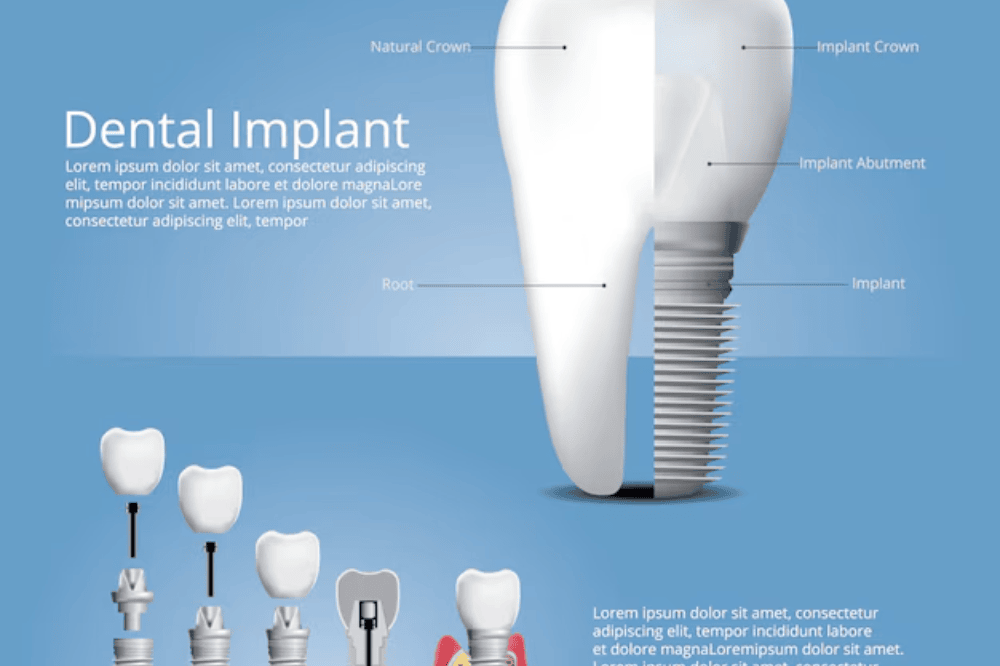
Losing a tooth—or a few—can shake your confidence and affect your daily life. But don’t worry! Modern dentistry offers exceptional solutions like dental implants, fixed bridges, and removable partial dentures. If you aim for a natural, long-lasting fix, exploring dental implants near you could be the ideal choice. Let’s explore these options and find the perfect fit to restore your smile and confidence!
Dental Implants: The Top Choice for Tooth Replacement
What Are Dental Implants?
Dental implants are like the game-changers of tooth replacement. They’re small titanium posts that are inserted into your jawbone. Think of them as artificial tooth roots. Once in place, they provide a sturdy base for attaching replacement teeth. The result? A replacement that seamlessly blends in and feels like your own natural teeth.
How It Works
- Implant Placement: The process starts with a quick procedure where your dentist places the titanium post into your jawbone. You’ll be numb, so there’s no need to worry about pain.
- Healing Time: During the implant healing process, your jawbone gradually fuses with the dental implant through osseointegration. This vital process ensures the implant remains securely in place, creating a solid foundation for your new tooth.
- Crown Attachment: Once the implant is fully integrated, your dentist attaches a custom-made crown to complete your new tooth.
Who Should Consider Implants?
Implants are great if you have healthy gums and enough bone in your jaw. If you have bone loss or other medical issues, don’t worry—your dentist will help you figure out the best plan.
Pros:
- Longevity: With the proper care, implants can last you a lifetime.
- Natural Feel: They function just like your own teeth.
- Bone Health: They help keep your jawbone healthy.
Cons:
- Cost: They are usually the most expensive option.
- Healing Time: The process can take several months.
Fixed Bridges: A Quick and Efficient Solution
What Are Fixed Bridges?
Fixed bridges are another popular option. They consist of one or more artificial teeth (pontics) anchored to the adjacent natural teeth or implants, creating a “bridge” over the gap where the missing teeth used to be.
Types of Fixed Bridges
- Traditional Bridges: Supported by crowns on the teeth next to the gap.
- Cantilever Bridges: Used when there’s only one adjacent tooth.
- Maryland Bridges: Feature metal or porcelain wings that attach to the back of neighbouring teeth.
How It Works
Your dentist prepares the neighbouring teeth or implants by placing crowns on them. Impressions are then taken to create a custom bridge that fits perfectly. The bridge is placed and adjusted for comfort.
Who Should Consider Bridges?
Bridges are great if you want a quicker solution without surgery and have healthy teeth on either side of the gap.
Pros:
- Speed: Faster to place than implants.
- Less Invasive: No surgery needed.
Cons:
- Impact on Adjacent Teeth: Neighbouring teeth may need to be altered.
- Durability: Bridges usually need replacement after several years.
Removable Partial Dentures: Flexible and Affordable
What Are Removable Partial Dentures?
Removable partial dentures offer a versatile solution for replacing one or more missing teeth.
They feature an acrylic base that mimics your gums and a metal framework with clasps to hold everything in place securely. While they provide flexibility and ease of use, they may not offer the same level of long-term tooth restoration as more permanent options like dental implants.
How They Work
The denture is custom-made to fit around your remaining teeth. The acrylic base supports the artificial teeth, and the metal framework helps keep the denture in place. It’s easy to remove for cleaning and adjustments.
Who Should Consider Dentures?
Partial dentures are ideal if you’re looking for a flexible and budget-friendly solution. They’re perfect if you want something you can easily remove and put back in.
Pros:
- Flexibility: Easy to remove for cleaning and adjustments.
- Cost-Effective: Generally less expensive than implants or bridges.
Cons:
- Comfort: They might feel bulky or awkward at first.
- Maintenance: Requires daily removal and cleaning.
Comparing Your Options
Durability and Longevity
- Implants: Last a lifetime with good care.
- Fixed Bridges: Typically last 5-15 years.
- Removable Partial Dentures: Usually need replacement every 5-7 years.
Cost Considerations
- Implants: Higher initial cost but offer long-term benefits.
- Fixed Bridges: Moderate cost, more affordable than implants.
- Removable Partial Dentures: Most budget-friendly.
Maintenance and Oral Hygiene
- Implants: Brush and floss like your natural teeth.
- Fixed Bridges: Requires careful cleaning around the bridge.
- Removable Partial Dentures: Needs daily removal and cleaning.
Impact on Daily Life
- Implants: Function like natural teeth, making eating and speaking easy.
- Fixed Bridges: Provide good function but may affect adjacent teeth.
- Removable Partial Dentures: This can take some getting used to, especially for eating and speaking.
Your Path to a Perfect Smile Starts Here
Finding a suitable tooth replacement is crucial in restoring your smile and boosting your confidence. Whether you’re considering durable dental implants, fast-acting fixed bridges, or versatile removable partial dentures, each option offers unique benefits.
At Lakeshore Dental Care, we’re here to help you find the best choice for your smile. If you’re interested in dental implants or need guidance on other options, don’t hesitate to get in touch. Our team is dedicated to helping you achieve a smile you’ll love. Book an appointment with our dentist in St. Cloud today and start your journey toward a beautiful new smile!
